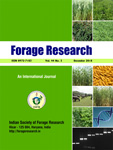KAJAL SINGH, SEVA NAYAK DHEERAVATHU,*, PRAMOD W. RAMTEKE,**, REETU, NILAMANI DIKSHIT AND THULASI BAI VADITHE
Department of Biological Sciences, Sam Higginbottom University of Agriculture,
Technology and Sciences, Allahabad (Uttar Pradesh), India
ICAR-Indian Grassland and Fodder Research Institute, Jhansi (Uttar Pradesh), India
Department of Microbiology, Acharya Nagarjuna University, Guntur (Andhra Pradesh), India
*(e-mail : sevanayak2005@gmail.com)
(Received : 10 December 2020; Accepted : 30 December 2020)
SUMMARY
Morpho-physiological and green fodder yield of three BN Hybrid varieties viz., BNH-3, BNH-6, BNH-10 and one TSH Hybrid were assessed under different gradient of soil salt concentrations viz., control, 4, 6 and 8 ECe (dSm-1) in pots condition under net house. The experiment was laid out in a factorial Completely Randomized Design (CRD) with three replications. The results indicated that salinity stress has significant negative effect on the plant’s morphological traits, such as its shoot and root length, root volume, root fresh weight and shoot biomass. The results of this study indicate that salinity stress has significant negative effect on Tri-Specific Hybrid and Bajra Napier Hybrids morphological traits which results in green fodder yield loss. Shoot biomass exhibited/indicated highly positive significant correlation with plant height, number of leaves and leaf area but negative significant correlation was recorded with numbers of tillers at p<0.01 and 0.05 levels. Mean percentage of reduction in plant height, number of leaves, leaf size, shoot biomass, root length and root mass was higher in BNH-6 while lowest was measured in BNH-3 among the four investigated varieties.
Key words:Hybrid Napier, Tri-specific hybrid (TSH), salt stress, soil ECe, green fodder yield

